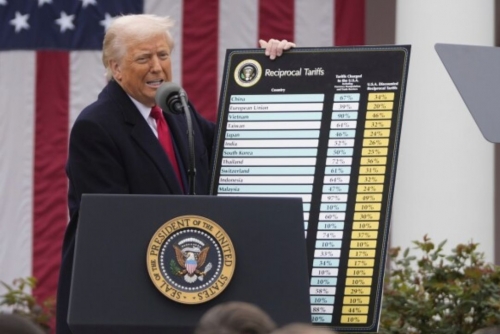U.S. Trade Court Blocks Trump’s Sweeping Global Tariffs
TDT | Manama
Email: mail@newsofbahrain.com
The U.S. Court of International Trade has blocked his administration’s sweeping global tariffs, ruling that the president overstepped constitutional limits.
The three-judge panel in New York determined that the White House’s use of the 1977 International Emergency Economic Powers Act (IEEPA) did not grant the president authority to unilaterally impose broad import duties on nearly every U.S. trading partner. The court reaffirmed that the Constitution assigns Congress— not the president, the sole power to regulate international commerce.
The ruling halts tariffs that impacted dozens of nations, including key allies like the EU, UK, Canada, Mexico, and China. However, it does not apply to specific tariffs on cars, steel, and aluminum, which were enacted under a different statute.
Who Filed the Legal Challenge?
Two separate lawsuits sparked the court’s decision. The nonpartisan Liberty Justice Center filed one on behalf of small businesses affected by the tariffs. The second challenge came from a coalition of 12 U.S. state governments, including New York, which challenged the constitutionality of the policy.
📜 The Court’s Key Findings
-
The IEEPA does not authorize blanket tariffs for non-emergency trade policy.
-
The “Liberation Day” tariffs— Trump's term for his economic reset— violated the separation of powers.
-
Additional levies on Canada, Mexico, and China were also invalidated, having been justified on grounds of immigration and drug enforcement.
Reactions Pour In
The White House, now under appeal, has criticized the ruling. “It is not for unelected judges to decide how to properly address a national emergency,” said Deputy Press Secretary Kush Desai.
By contrast, New York Attorney General Letitia James praised the decision: “The law is clear: no president has the power to single-handedly raise taxes whenever they like.”
Following the announcement, stock markets in Asia and the U.S. saw gains, while European indexes remained steady.
What Happens Next?
The court gave the White House 10 days to begin the administrative process to lift the tariffs. However, the administration has requested a temporary hold on the ruling while it prepares an appeal, which could ultimately reach the Supreme Court.
Even if the appeal fails, Trump retains the option to reintroduce tariffs under different provisions, including Section 122 of the Trade Act of 1974, which allows temporary tariffs of up to 15% for balance-of-payment issues. Analysts at Goldman Sachs suggest this route could be enacted within days.
Another possible path involves invoking the rarely used 1930 Smoot-Hawley Tariff Act, allowing tariffs of up to 50% on nations deemed discriminatory toward the U.S.
What This Means for Businesses
According to former U.S. Customs official John Leonard, for now, importers must continue paying tariffs at the border. If the White House loses on appeal, Customs and Border Protection would be required to refund payments retroactively.
The ruling also throws uncertainty into ongoing U.S. trade negotiations. Experts believe many international partners may now delay deals until the legal battle is resolved.
Earlier this month, the UK and U.S. agreed to reduce tariffs on certain key goods, such as steel, aluminum, and vehicles. While those sector-specific reductions remain unaffected, the blanket 10% tariff on other UK imports now appears legally vulnerable.
The UK government has not yet issued a formal statement but affirmed its commitment to ensuring British firms benefit from the deal “as quickly as possible.”
Related Posts

